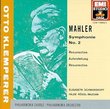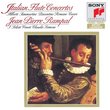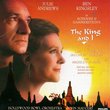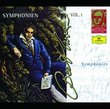| All Artists: Vaughan Williams, Sir Adrian Boult, New Philharmonia Orchestra Title: Vaughan Williams: Symphony Nos. 4 & 6 Members Wishing: 0 Total Copies: 0 Label: EMI Records Ltd. Original Release Date: 1/1/1967 Genre: Classical Styles: Historical Periods, Modern, 20th, & 21st Century, Symphonies Number of Discs: 1 SwapaCD Credits: 1 UPC: 077774721523 |
Search - Vaughan Williams, Sir Adrian Boult, New Philharmonia Orchestra :: Vaughan Williams: Symphony Nos. 4 & 6
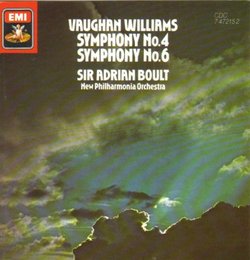 | Vaughan Williams, Sir Adrian Boult, New Philharmonia Orchestra Vaughan Williams: Symphony Nos. 4 & 6 Genre: Classical |
Larger Image |
CD DetailsSimilarly Requested CDs |
CD ReviewsMeet Ralph Vaughan-Williams, the composer you thought you kn John Grabowski | USA | 09/23/2006 (5 out of 5 stars) "You probably think you already know Ralph Vaughan-Williams, right? Bucolic British chap with the stiff upper lip who wrote all that pastorale stuff, that atmospheric stuff. Cows grazing and Big Ben chiming and all that, right?
Well, this is RVW like you've likely never heard him before, with braun and muscle, with darkness and angst. Heck, it's almost *modern.* The Fourth Symphony is bold and uncompromising technically, yet completely approachable by classical novices and should be firmly in the mainstream repertoire of all symphony orchestras. It's not, which may be one reason symphony orchestras aren't connecting with younger blood like they should. The whole thing revolves around very claustrophobic intervals of minor seconds, so that when, in the finale, we finally break into *major seconds*--hardly an expansive interval--the clouds seem to part and the sunlight pours forth. Rarely have I heard such a well-proportioned work, one with a master plan so evident from the first page, and one with such a satisfying and inevitable ending. (As any composer, playwright or novelist will tell you, endings are a *bitch.*) The Sixth is another work that's atypical for Vaughan-Williams. The author of the liner notes for this release (Michael Kennedy) speaks of the finale resembling Holst's movement "Neptune" from his celestial suite The Planets, but to me it bears more than a passing relationship to a more unlikely source--Bartok's Music for Strings, Percussion and Celeste (1937), particularly in the way the layers of sound develop. (The handling of the winds does remind me of the Holst, as there are no winds to handle in the Bartok.) Whatever the inspiration, this is a very unique and satisfying ending once again. With its harsh, earth-bound earlier movements (which again echo Holst, although parts of the second movement have that "ambling portentiousness" of Shostakovich in his "war symphonies"), and its reflection on the war years in England, it's a unique document, and also deserves more prominance in the concert repertoire. Why has music like this--and RVW in general--faded recently? These works certainly aren't being recorded much, either, judging by the number of recordings listed as available. This EMI pairing is just about the best out there--there's also a fine Previn set on EMI with the LSO, but good luck finding it. These recordings by master V-W interpretor Adrian Boult will more than satisfy, however, and the late '60s sound of the Philharmonia is crisp and well-balanced. Just watch the pricing--there are several ways on Amazon to get these same works--some are a lot less expensive than others. But you should have these in your collection, even if you think you don't like Vaughan-Williams. If you're not familiar with these, the loss is yours." |

